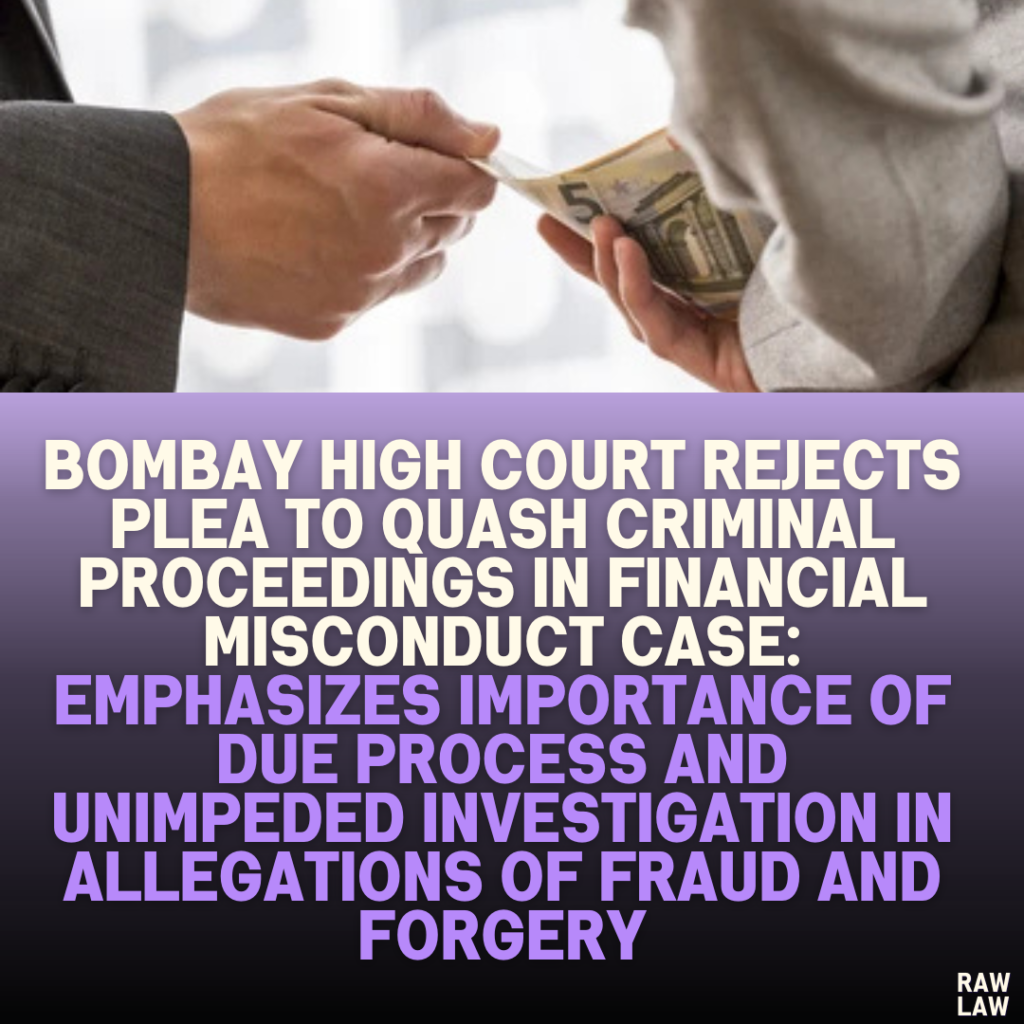Court’s Decision
The Bombay High Court (Goa Bench) dismissed the petitioner’s request to quash the criminal proceedings. The petitioner was accused of offenses under various sections of the Indian Penal Code (IPC) related to fraud, misappropriation of funds, and forgery. The Court ruled that the investigation must proceed to ascertain the truth of the allegations. The emphasis was on the need for due process and an unimpeded investigation.
Facts
- Background of Allegations: The petitioner was accused of misappropriating funds in a business scheme. The allegations included promises made to investors that were not fulfilled, resulting in financial losses for multiple victims.
- Judicial Custody: The petitioner has been in custody since his arrest, reflecting the severity of the charges and the ongoing investigation’s significance.
- Key Accusation: The crux of the allegations was dishonesty and fraudulent practices, which purportedly led to a breach of trust and harm to the victims.
Issues
- Whether the continuation of criminal proceedings was justified based on the allegations.
- Whether procedural irregularities in the investigation infringed on the petitioner’s fundamental rights.
These issues framed the scope of the court’s examination, balancing procedural fairness against the need to investigate serious allegations.
Petitioner’s Arguments
- Baseless Allegations: The petitioner contended that the allegations were motivated by malice and lacked substantive evidence.
- Delay in Filing the Complaint: The petitioner raised concerns about the delay in initiating legal action, which they argued undermined the credibility of the claims.
- Violation of Rights: Procedural irregularities, such as potential lapses in due process during the investigation, were presented as a basis for quashing the proceedings.
Respondent’s Arguments
- Prima Facie Evidence: The respondents asserted that the allegations had sufficient supporting material to warrant an investigation.
- Justified Delay: The respondents explained that the delay in filing the complaint was due to the complexity of the financial transactions and the need for detailed examination.
- Public Interest: They argued that the nature of the alleged offenses demanded thorough investigation without judicial interference.
Analysis of the Law
The court examined the applicable sections of the IPC, including:
- Section 406 and 409: Criminal breach of trust, particularly by someone in a fiduciary capacity.
- Section 420: Cheating and dishonest inducement.
- Sections 467, 468, and 471: Forgery and use of forged documents.
The court reaffirmed that the legal provisions aim to address financial misconduct and emphasized that investigations into such offenses are vital to upholding public confidence in justice.
Precedent Analysis
- Key Precedent: The court referred to State of Haryana v. Bhajan Lal, a landmark case outlining circumstances for quashing FIRs. The ruling established that interference by the courts is only permissible in exceptional circumstances, such as when the allegations do not disclose a cognizable offense.
- Application in the Case: The court concluded that this case did not meet the criteria for quashing, as there was prima facie material requiring judicial scrutiny.
Court’s Reasoning
The court provided the following rationale:
- Seriousness of Allegations: The allegations involved significant financial misconduct, affecting multiple victims.
- Judicial Non-Interference in Investigations: The court stressed the importance of allowing investigations to proceed unhindered unless there are clear violations of rights or procedural norms.
- Balance of Rights: While acknowledging the petitioner’s concerns, the court noted that procedural safeguards could be ensured during the investigation and trial stages.
The court remarked: “The judiciary must exercise caution while interfering with ongoing investigations, particularly when allegations disclose cognizable offenses.”
Conclusion
The petition was dismissed, with the court permitting the investigation to proceed. It also directed the authorities to ensure adherence to procedural safeguards to protect the petitioner’s rights. This decision upheld the principle of a fair trial while prioritizing the public interest in addressing financial crimes.
Implications
The judgment has broader implications:
- Judicial Approach to Economic Offenses: The ruling underscores the judiciary’s cautious approach to interfering in investigations involving financial misconduct.
- Reaffirmation of Precedents: The decision aligns with established precedents, ensuring consistency in the application of legal principles.
- Public Confidence: By allowing the investigation to continue, the court reinforced the importance of accountability and transparency in addressing allegations of fraud.
